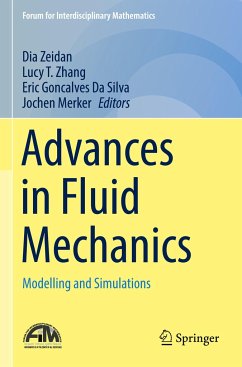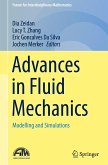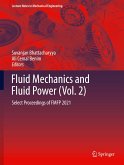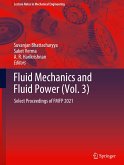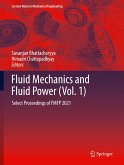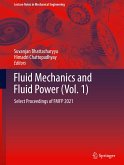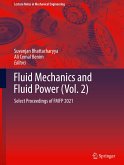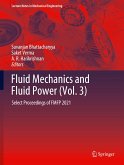Advances in Fluid Mechanics
Modelling and Simulations
Herausgegeben:Zeidan, Dia; Zhang, Lucy T.; Da Silva, Eric Goncalves; Merker, Jochen
Advances in Fluid Mechanics
Modelling and Simulations
Herausgegeben:Zeidan, Dia; Zhang, Lucy T.; Da Silva, Eric Goncalves; Merker, Jochen
- Broschiertes Buch
- Merkliste
- Auf die Merkliste
- Bewerten Bewerten
- Teilen
- Produkt teilen
- Produkterinnerung
- Produkterinnerung
This edited book provides invited and reviewed contributions in mathematical, physical and experimental modelling and simulations in all fluid mechanics branches. Contributions explore the emerging and state-of-the-art tools in the field authored by well-established researchers to derive improved performance of modelling and simulations. Serving the multidisciplinary fluid mechanics community, this book aims to publish new research work that enhances the prediction and understanding of fluid mechanics and balances from academic theory to practical applications through modelling, numerical…mehr
Andere Kunden interessierten sich auch für
![Advances in Fluid Mechanics Advances in Fluid Mechanics]() Advances in Fluid Mechanics119,99 €
Advances in Fluid Mechanics119,99 €![Fluid Mechanics and Fluid Power (Vol. 2) Fluid Mechanics and Fluid Power (Vol. 2)]() Fluid Mechanics and Fluid Power (Vol. 2)209,99 €
Fluid Mechanics and Fluid Power (Vol. 2)209,99 €![Fluid Mechanics and Fluid Power (Vol. 3) Fluid Mechanics and Fluid Power (Vol. 3)]() Fluid Mechanics and Fluid Power (Vol. 3)208,99 €
Fluid Mechanics and Fluid Power (Vol. 3)208,99 €![Fluid Mechanics and Fluid Power (Vol. 1) Fluid Mechanics and Fluid Power (Vol. 1)]() Fluid Mechanics and Fluid Power (Vol. 1)224,99 €
Fluid Mechanics and Fluid Power (Vol. 1)224,99 €![Fluid Mechanics and Fluid Power (Vol. 1) Fluid Mechanics and Fluid Power (Vol. 1)]() Fluid Mechanics and Fluid Power (Vol. 1)223,99 €
Fluid Mechanics and Fluid Power (Vol. 1)223,99 €![Fluid Mechanics and Fluid Power (Vol. 2) Fluid Mechanics and Fluid Power (Vol. 2)]() Fluid Mechanics and Fluid Power (Vol. 2)208,99 €
Fluid Mechanics and Fluid Power (Vol. 2)208,99 €![Fluid Mechanics and Fluid Power (Vol. 3) Fluid Mechanics and Fluid Power (Vol. 3)]() Fluid Mechanics and Fluid Power (Vol. 3)209,99 €
Fluid Mechanics and Fluid Power (Vol. 3)209,99 €-
-
-
This edited book provides invited and reviewed contributions in mathematical, physical and experimental modelling and simulations in all fluid mechanics branches. Contributions explore the emerging and state-of-the-art tools in the field authored by well-established researchers to derive improved performance of modelling and simulations. Serving the multidisciplinary fluid mechanics community, this book aims to publish new research work that enhances the prediction and understanding of fluid mechanics and balances from academic theory to practical applications through modelling, numerical studies, algorithms and simulation. The book offers researchers, students and practitioners significant insights on modelling and simulations in fluid mechanics. It offers readers a range of academic contributions on fluid mechanics by researchers that have become leaders in their field. The research work presented in this book will add values to the existing literature in terms of what needs to bedone better to direct modelling and simulations towards a growing and rapidly developing field.
Produktdetails
- Produktdetails
- Forum for Interdisciplinary Mathematics
- Verlag: Springer / Springer Nature Singapore / Springer, Berlin
- Artikelnr. des Verlages: 978-981-19-1440-9
- 1st edition 2022
- Seitenzahl: 244
- Erscheinungstermin: 8. Juni 2023
- Englisch
- Abmessung: 235mm x 155mm x 14mm
- Gewicht: 376g
- ISBN-13: 9789811914409
- ISBN-10: 9811914400
- Artikelnr.: 68008690
- Herstellerkennzeichnung
- Springer-Verlag GmbH
- Tiergartenstr. 17
- 69121 Heidelberg
- ProductSafety@springernature.com
- Forum for Interdisciplinary Mathematics
- Verlag: Springer / Springer Nature Singapore / Springer, Berlin
- Artikelnr. des Verlages: 978-981-19-1440-9
- 1st edition 2022
- Seitenzahl: 244
- Erscheinungstermin: 8. Juni 2023
- Englisch
- Abmessung: 235mm x 155mm x 14mm
- Gewicht: 376g
- ISBN-13: 9789811914409
- ISBN-10: 9811914400
- Artikelnr.: 68008690
- Herstellerkennzeichnung
- Springer-Verlag GmbH
- Tiergartenstr. 17
- 69121 Heidelberg
- ProductSafety@springernature.com
Dia Zeidan is Associate Professor of Applied and Computational Mathematics at the German Jordanian University, Amman, Jordan, and Elected Fellow of the European Society of Computational Methods in Sciences and Engineering. An active researcher in developing mathematical and numerical tools of multiphase fluid flow problems for several years, he is recognized for research contributions in applied and computational mathematics with multiphase flows including his creative approaches to teaching and research. His work has been highly interdisciplinary, involving international collaborations with applied and computational researchers. Among various institutional obligations, he has been visitor of several important international research groups bridging with national research infrastructure gaps in Jordan. He serves on several expert review panels, as Technical Editor and Reviewer for several peer-reviewed journals and as Member of several program committees of technical conferences around the world. Lucy T. Zhang is Professor at the Department of Mechanical, Aerospace and Nuclear Engineering at Rensselaer Polytechnic Institute (RPI), U.S.A. She is an elected Fellow of American Society of Mechanical Engineers. Her research interests focus on building advanced and robust computational tools and software for accurate and ef¿cient multiphysics and multiscale simulations that can be used for engineering applications in biomechanics, micro- and nano-mechanics, medicine and defense projects involving impacts. She is a recipient of the Young Investigator Award at the International Conference for Computational Methods. Her pioneer work in developing the immersed ¿nite element method had been and is still being widely used in academic engineering and scienti¿c communities. Professor Zhang is now developing open-source tools and technology, OpenIFEM, that can convenientlyand ef¿ciently couple any existing solvers for multiphysics and multiscale simulations and analysis. She is Associate Editor of the Journal of Fluid and Structures, ASME Journal of Fluids Engineering and Computer Methods and Engineering Sciences. Eric Goncalves Da Silva is Professor and Head of the Department Fluid Mechanics and Aerodynamics, Aeronautical Engineering School ISAE-ENSMA, Poitiers, France. His research interests are related to the modelling and the simulation of flows for which the density is variable such as compressible flow, two-phase flow and cavitation. Recent work includes shock wave boundary layer interaction, shock-bubble interaction and investigation of three-dimensional effects on cavitation pocket. Jochen Merker is Professor of Analysis and Optimization at the Leipzig University of Applied Sciences (HTWK Leipzig), Germany, since 2015. He received his Ph.D. in Mathematics from the University of Hamburg, Germany, in 2005. Afterwards, he worked as Postdoc in Applied Analysis at the University of Rostock, Germany, received his Habilitation in 2012 and became Professor at the Applied University of Stralsund, in 2013, before he became Full Professor at HTWK Leipzig. His research focuses on partial differential equations (PDEs) and functional analysis, particularly functional analytic settings for linear and nonlinear stationary and evolution equations, especially degenerate and singular parabolic PDEs with non-local terms, and on (contact) Hamiltonian systems on manifolds. Regarding this topic, in 2018, he received an honorable mention in the international Ian Snook Prize 2017 for his contribution in the field.
1. Steam Ejector Modelling and Simulations by CFD Approach (Au: Xiaodong Wang, He Li, Jingliang Dong, Guangli Zhang, Yu Han, Ao Li, Hongjian Lei, Hao Sun, Haolin Sun, and Jiyuan Tu).- 2. Computational Fluid Dynamics Applications in Cardiovascular Medicine-from Medical Image-based Modeling to Simulation: Numerical Analysis of Blood Flow in Abdominal Aorta (Au: Alin-Florin Totorean, Sandor Ianos Bernad, Tiberiu Ciocan, Iuliana-Claudia Totorean, and Elena Silvia Bernad).- 3. An Improved Density-based Compressible Flow Solver in OpenFOAM for Unsteady Flow Calculations (Au: Gaurav Kumar and Ashoke De).- 4. A Robust and Efficient Solver based on Kinetic Schemes for Magnetohydrodynamics (MHD) Equations (Au: Hubert Baty, Florence Drui, Emmanuel Franck, Philippe Helluy, Christian Klingenberg, and Lukas Thanhäuser). 5. Coupled Algorithms for CFD Applications: A Decade of Continuous Development (Au: M. Darwish, L. Mangani, F. Moukalled, and E. Casartelli).- 6. Finite Volume Models and Efficient Simulation Tools (EST) for Shallow Flows (Au: S. Martínez-Aranda, J. Fernández-Pato, I. Echeverribar, A. Navas-Montilla, M. Morales-Hernández, P. Brufau, J. Murillo, and P. García-Navarro).- 7. Overview of Outfall Discharge Modeling with a Focus on Turbulence Modeling Approaches (Au: Mostafa Taherian, Seyed Ahmad Reza Saeidi Hosseini, and Abdolmajid Mohammadian).- 8. A Unified Algorithm for Interfacial Flows with Incompressible and Compressible Fluids (Au: Fabian Denner and Berend van Wachem).- 9. Stabilized Finite Element Formulation and High-performance Solver for Slightly-compressible Navier-Stokes Equations (Au: Feimi Yu and Lucy T. Zhang).
1. Steam Ejector Modelling and Simulations by CFD Approach (Au: Xiaodong Wang, He Li, Jingliang Dong, Guangli Zhang, Yu Han, Ao Li, Hongjian Lei, Hao Sun, Haolin Sun, and Jiyuan Tu).- 2. Computational Fluid Dynamics Applications in Cardiovascular Medicine-from Medical Image-based Modeling to Simulation: Numerical Analysis of Blood Flow in Abdominal Aorta (Au: Alin-Florin Totorean, Sandor Ianos Bernad, Tiberiu Ciocan, Iuliana-Claudia Totorean, and Elena Silvia Bernad).- 3. An Improved Density-based Compressible Flow Solver in OpenFOAM for Unsteady Flow Calculations (Au: Gaurav Kumar and Ashoke De).- 4. A Robust and Efficient Solver based on Kinetic Schemes for Magnetohydrodynamics (MHD) Equations (Au: Hubert Baty, Florence Drui, Emmanuel Franck, Philippe Helluy, Christian Klingenberg, and Lukas Thanhäuser). 5. Coupled Algorithms for CFD Applications: A Decade of Continuous Development (Au: M. Darwish, L. Mangani, F. Moukalled, and E. Casartelli).- 6. Finite Volume Models and Efficient Simulation Tools (EST) for Shallow Flows (Au: S. Martínez-Aranda, J. Fernández-Pato, I. Echeverribar, A. Navas-Montilla, M. Morales-Hernández, P. Brufau, J. Murillo, and P. García-Navarro).- 7. Overview of Outfall Discharge Modeling with a Focus on Turbulence Modeling Approaches (Au: Mostafa Taherian, Seyed Ahmad Reza Saeidi Hosseini, and Abdolmajid Mohammadian).- 8. A Unified Algorithm for Interfacial Flows with Incompressible and Compressible Fluids (Au: Fabian Denner and Berend van Wachem).- 9. Stabilized Finite Element Formulation and High-performance Solver for Slightly-compressible Navier-Stokes Equations (Au: Feimi Yu and Lucy T. Zhang).

